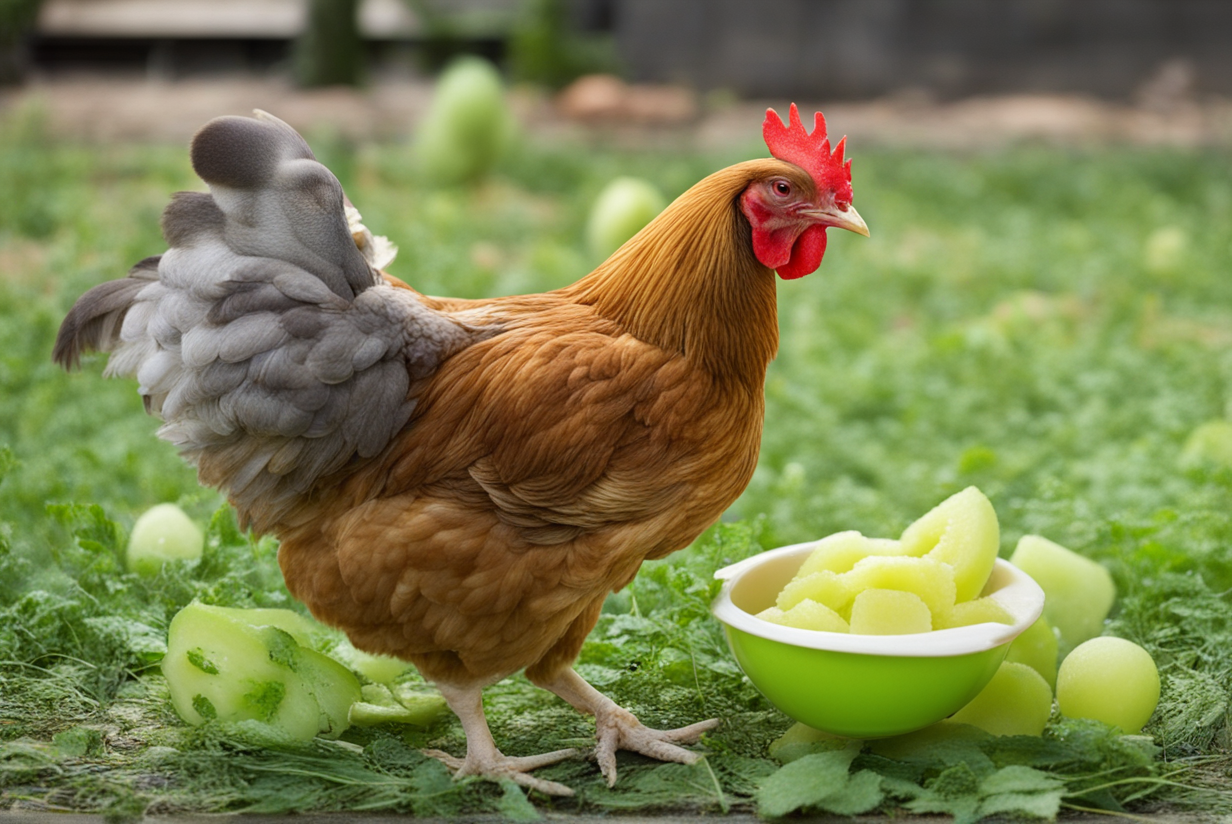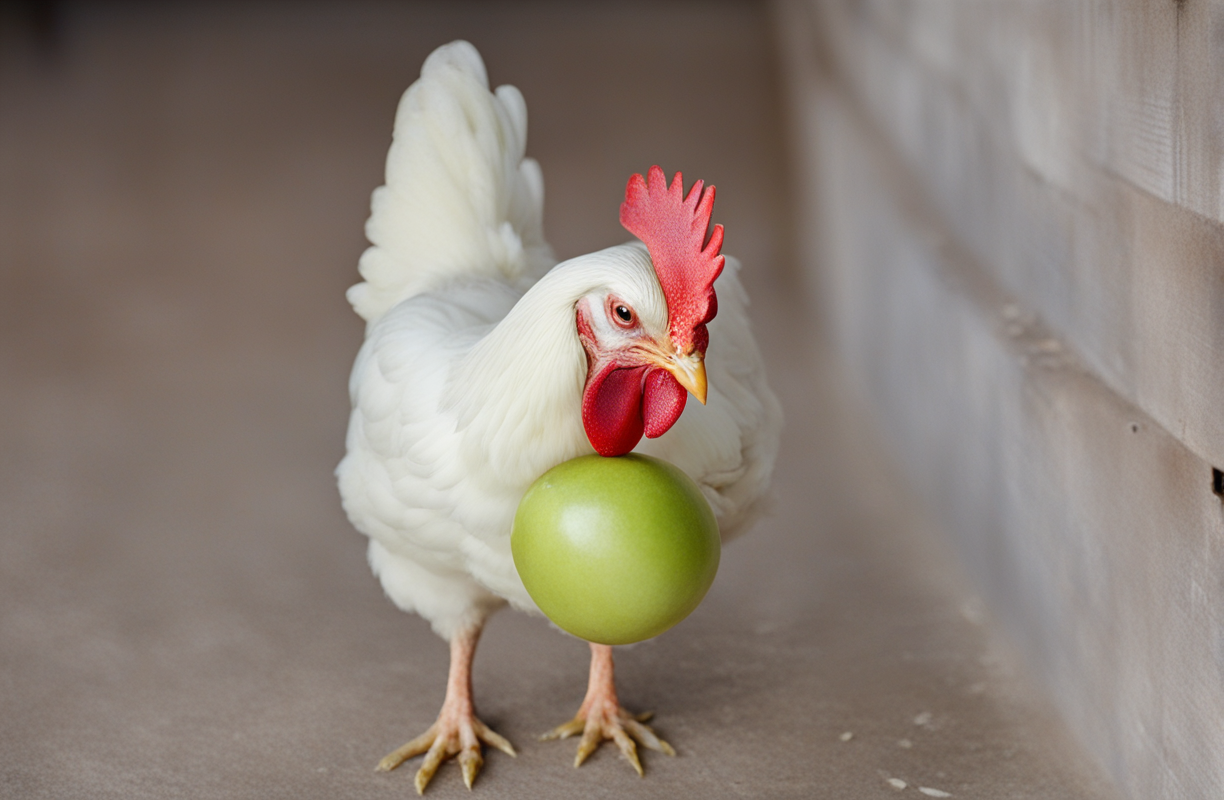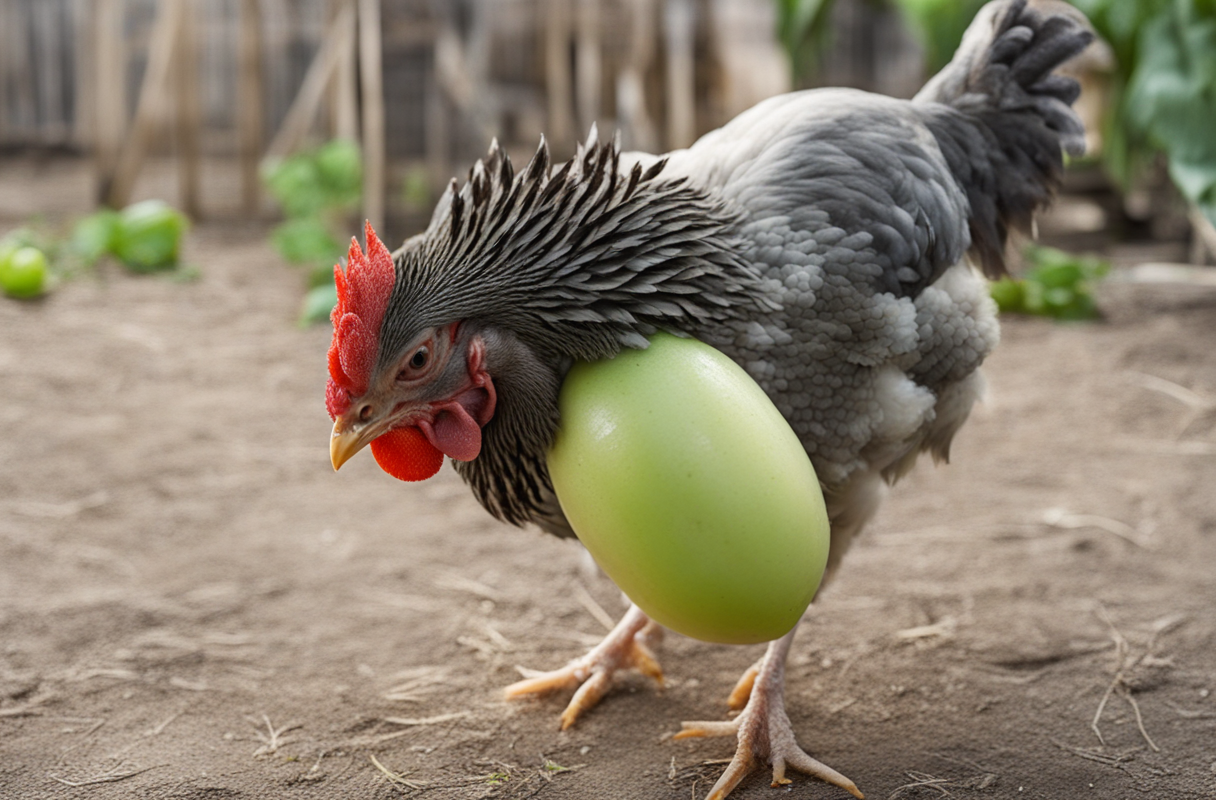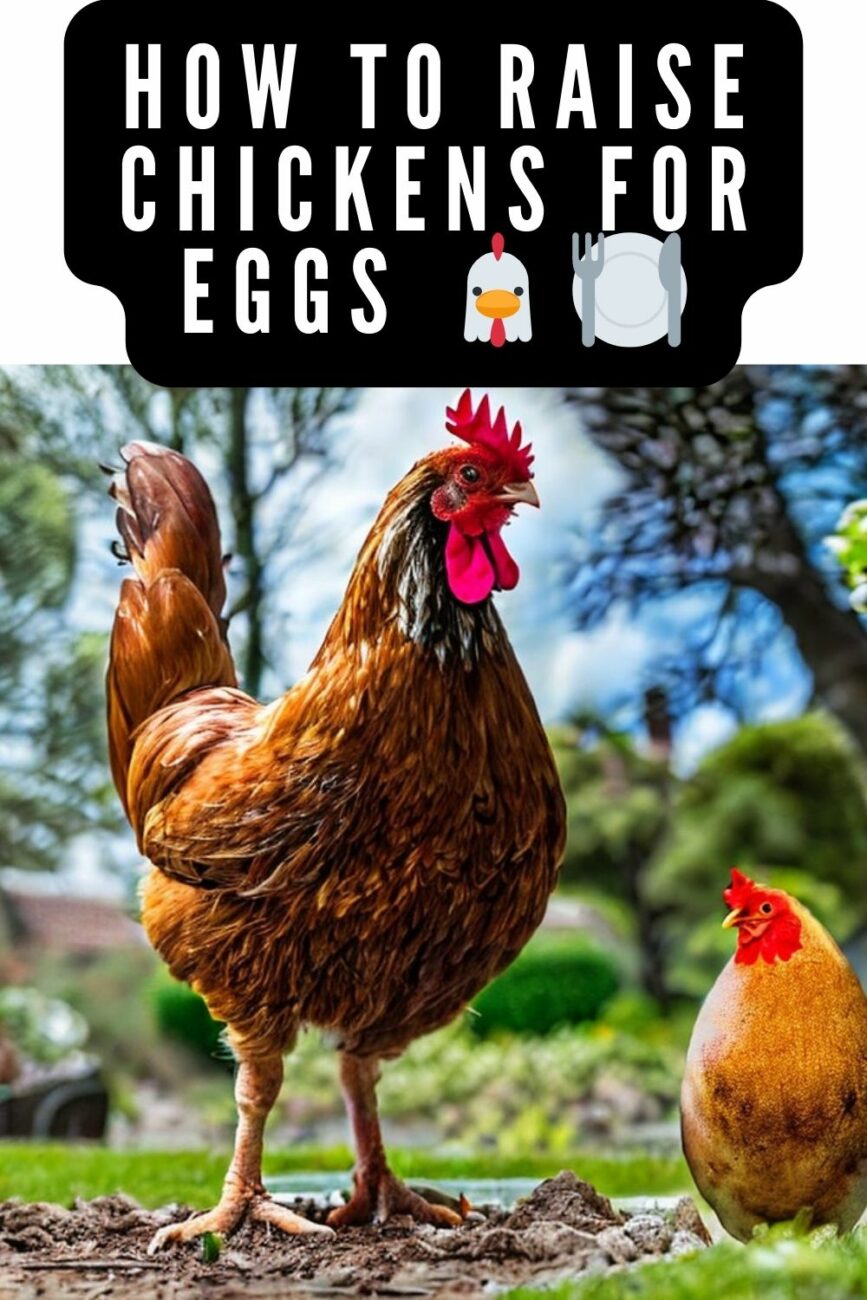I still remember the day I first wondered if chickens could eat honeydew.
It was a sunny summer morning and I was out in the backyard, just like always, tending to my little flock of six hens that I love like they’re my family.
As I was filling up the feeder and refreshing their water, I suddenly noticed that a few of the honeydew melons on the vines covering our backyard fence had fallen onto the ground overnight.
My chickens were happily pecking around the yard, foraging for bugs and seeds as chickens do, when they spotted those sweet, ripe melons lying there.
Of course, being curious chickens, they immediately wandered over and started pecking at the honeydews, seeming very interested in the new fruit they’d discovered.
Well, this made me wonder – can chickens eat honeydew? Or would it make them sick?
I didn’t want my feathery ladies to eat anything that might upset their stomachs or cause other issues.
But I also hated to see all that delicious fruit go to waste when my chickens seemed so eager to snack on it.
Being the curious, chicken-loving guy that I am, I just had to find out for sure if honeydew would be a safe treat for them.
So I went over, picked up one of the fallen melons, washed it off, and sliced it up.
Then I offered a juicy wedge to Matilda, my leading lady and the head hen of my little flock.
Without any hesitation, she gobbled it right up and started eagerly clucking for more!
Seeing Matilda enjoy her melon treat so much, the other chickens quickly scurried over to get in on the action.
Soon, I had all six of my girls gathered around me, excitedly waiting for their taste of sweet honeydew.
I couldn’t slice the melon fast enough to keep up with their enthusiasm – they were going crazy for this new fruity snack!
It was pretty clear from that experience that chickens definitely love honeydew melons.
The juicy green flesh and subtly sweet flavor seem completely irresistible to hens.
But just because my chickens enjoyed munching on honeydew so much, I still wasn’t sure if it was actually safe and healthy for them to eat it.
Nutritional Benefits of Honeydew for Chickens

After doing some research, I learned that honeydew melon offers some great nutritional perks for chickens.
Here are a few of the main health benefits it provides:
First, it’s very high in water content, which is important for keeping chickens well hydrated, especially in hot summer weather.
It also contains high amounts of vitamin C, B complex vitamins, potassium, copper, and other key nutrients chickens need to stay healthy and energetic.
In addition, honeydew is loaded with antioxidants that can give their immune systems a boost.
And the natural sugars provide a quick source of energy for busy, active chickens.
Beyond vitamins and minerals, the combination of nutrients supports chickens’ overall growth, egg production, and feather quality.
The high water content also helps with digestion and prevents constipation issues.
With that stellar nutritional profile, it’s no wonder my chickens go so nuts for honeydew melon.
All those nutrients support their health in a variety of important ways.
Possible Concerns with Feeding Honeydew

Even though I now knew that honeydew can provide great nutrition for chickens, I also learned there are a couple precautions to keep in mind when feeding it.
If chickens eat way too much melon in one serving, the high water content could cause loose droppings or diarrhea.
The natural sugars can also increase the risk for parasites and Candida overgrowth if honeydew makes up too much of their diet.
And since it contains a lot more water than chickens are used to from their regular feed, overdoing it could potentially cause digestive upset.
For those reasons, moderation is key when sharing honeydew with chickens.
While an occasional sliced melon makes a fun, nutrition-packed treat, letting chickens stuff themselves silly on unlimited honeydew may lead to some issues.
I found that limiting treats like fruit to no more than 5-10% of my chickens’ total daily diet was a good rule of thumb to follow.
That small treat portion has been enough to satisfy their sweet tooth and desire for variety without disrupting their digestion.
Serving Suggestions for Honeydew

When sharing honeydew melons with my flock, I kept these tips in mind:
It’s important to wash the rind very thoroughly before cutting to remove any bacteria from the surface.
Cutting the melon into bite-sized pieces or thin slices makes it easier for the chickens to pick up and eat.
I remove all the rind and seeds, since those tough, fibrous pieces could cause choking.
I like to either place the melon in a separate dish to keep it from getting mixed into their feed, or scatter it loosely around the yard.
Only giving them a few small pieces per chicken prevents gorging and potential tummy trouble.
I always start with just a taste the first time I offer a new treat to monitor for any signs of issues or allergies.
Keeping treats as an occasional separate snack, rather than chopping up lots of fruit into their feed, allows better control over portion sizes.
The bottom line after my honeydew experiments?
Chickens can absolutely enjoy honeydew melon in moderation!
As an infrequent part of a balanced diet, it offers chickens a very tasty, nutrition-packed treat.
Just be mindful not to overdo it, which could lead to some digestive troubles.
But if you end up with excess honeydew this summer like I often do, your flock will be thrilled if you share the bounty with them!
Have you ever served honeydew melons to your chickens? Let me know in the comments how much they enjoyed it!
How Often Can Chickens Eat Honeydew?
When I first let my chickens try honeydew, they loved it so much, I wondered if I could feed it to them every day.
But since too much of a good thing can be problematic, I tried to figure out the best frequency for serving it as a treat.
I learned that chickens can safely eat small amounts of honeydew anywhere from 2-3 times per week.
Feeding it 1-2 times weekly may be a better frequency for flocks prone to loose droppings.
Limiting honeydew to no more than a couple times a month is best if dealing with a parasite problem.
For my flock, I found that letting them enjoy honeydew 2-3 times per week worked well.
That kept it as an enticing treat to look forward to without disrupting their digestion or health.
Pay attention to each chicken’s reaction for signs of any sensitivity or overfeeding.
Adjusting frequency based on their unique needs and tolerance helps prevent issues.
Moderation is key, so stay within the 2-3 times per week range for the average healthy flock.
Can Chickens Eat Cantaloupe Too?
After seeing how much my chickens adored honeydew melon, I wondered if they could also eat cantaloupe.
So the next time I had excess cantaloupe, I sliced some up and offered it to the flock.
They gobbled up the orange melon almost as eagerly as they did the honeydew.
Turns out cantaloupe is perfectly safe for chickens to eat and offers similar benefits.
Like honeydew, it provides lots of water to keep chickens hydrated.
It also contains antioxidants, vitamin A, potassium, and other key nutrients.
Cantaloupe has a higher vitamin C content than honeydew.
It can be fed 2-3 times weekly in small portions as an occasional treat.
The serving tips are the same, like removing rind and seeds first.
One difference is that cantaloupe has a stronger flavor and aroma.
So start with just a few tiny pieces to make sure your flock likes it.
But both melons can be enjoyed by chickens as part of a balanced diet.
Foraging for Honeydew in the Garden
I like to let my chickens forage and graze freely in my vegetable garden.
Once I knew honeydew was safe, I started wondering if they could forage for it themselves.
Allowing chickens to nibble on fallen fruit and veg can encourage natural foraging behavior.
So I purposely left a few ripe honeydews scattered under the vines in their run.
The chickens had a blast hunting for the sweet treats hidden in the mulch.
They excitedly scratched and pecked all around until finding each melon chunk.
It was great enrichment and helped satisfy their strong foraging instinct.
But I still monitored closely to prevent gorging or choking hazards.
Ultimately letting them forage for limited amounts worked well.
They enjoyed the melons even more when they “found” it themselves.
Making Honeydew Chicken Treat Recipes
I like coming up with healthy treat recipes to mix up my flock’s diet.
Once I confirmed chickens could eat it, honeydew inspired some recipe ideas.
One fun option is freezing melon chunks in ice cube trays for cooling summer treats.
You can also blend honeydew with yogurt for a sweet, protein-packed smoothie.
Mixing small diced melon pieces into baked chicken treats adds natural flavor.
For a nutritious snack, combine chopped honeydew with seeds and crushed eggshells.
Or add finely diced melon to their grain-free food mix.
Stirring a few tablespoons of pureed honeydew into plain yogurt makes a tasty dip.
For a hydrating treat, freeze pureed melon into ice pops in molds.
Always avoid added sugar and limit overall portions when making any homemade chicken treats.
Cautions about feeding honeydew to chickens
While honeydew is safe for chickens, there are some cautions to keep in mind.
Feeding too much can cause digestive upset due to excess water and sugar content.
Eating rind or seeds poses a choking hazard and provides little nutritional value.
Overripe or damaged melons may contain more bacteria or molds.
Allowing unlimited access could lead to overeating and health issues.
Honeydew shouldn’t make up more than a small part of their overall diet.
Sudden big amounts could potentially cause diarrhea or nutritional imbalance.
Always introduce new treats slowly and watch for signs of sensitivity.
Remove honeydew immediately if any chickens show adverse reactions.
Issues are unlikely but possible if chickens gorge on melon.
Pay attention to each bird’s tolerance level and adjust accordingly.
